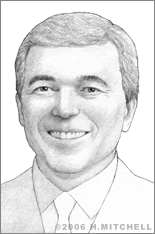Jay Walker
Entrepreneur Jay Walker's accomplishments are somewhat unique in terms of how they fit in with the concept of invention. His innovative ideas have lead to patentable, intellectual property-based new business models.
Born in 1956, Walker grew up in Yonkers, New York and by the age of eight showed his prowess as a budding businessman when he began selling candy to kids at summer camp. While attending Cornell University in Ithaca, New York, he took some time off to try and start his own local newspaper. When that didn't work, he wrote and published a book called "1000 Ways to Win at Monopoly," which brought him enough revenue to pay off debt incurred from his failed newspaper venture. He completed his bachelor's degree in industrial relations at Cornell in 1978.
Armed with an unflappable entrepreneurial spirit, Walker set out on a career that has spurred more than 20 new businesses. One of his early successes was Catalog Media Corp., which helped Federal Express get involved in the mail-order delivery business, followed by his co-founding NewSub Services (now Synapse), a direct mail company that targeted credit card customers for sales and automatic renewal of magazine subscriptions. Walker was awarded the Direct Marketer of the Year award in 1999 for his work with this company, which was subsequently purchased by Time Warner. He also founded Target Communications, a conference and publishing company, which he sold to Primedia in 2000.
His biggest claim to fame, however, is his creation of the business model that serves as the basis for Priceline.com, the e-commerce company he founded in 1997. Via a separate company he established called Walker LLC in Stamford, Conn., Walker and colleagues worked on the model and the technology that would become e-commerce phenomenon Priceline.com. A patent for its business process was issued on Aug. 11, 1998.
The Priceline system creates buyer-driven commerce through the Internet that allows consumers to submit a bid, known as a "conditional purchase offer," to buy goods or services from unknown sellers at a certain price. Buyers, meanwhile, guarantee their "offers" with a credit card. Once Priceline presents the offers to the sellers, the sellers have the option of fulfilling or rejecting the bids, or making counteroffers. Priceline is responsible for completing the transactions.
A buyer who wants to purchase an airline ticket from Los Angeles to New York, for example, can set conditions on his or her bid, such as number of layovers, price limit, specific dates or times of the day. Any airline participating in the Priceline.com system would have a chance to review the offers. The first to respond and meet all conditions set by the buyer gets the sale.
Customers took quickly to the model and within 90 days of its 1998 launch, Priceline was handling more than $10 million in sales. The site's "demand collection system" offers benefit to both consumers and vendors by enabling customers to use the Internet to buy products and services at prices that offer them cost-savings, while at the same time enabling sellers to generate incremental revenue.
Priceline's "Name-Your-Own-Price" system made the company a smashing success during the dot-com boom of the late 1990s. The company went public in 1999 with airline tickets and other travel services. Later it began experimenting with products and services such as groceries, cars and telecom services as well. None of these were successful, however, and were terminated. Today, travel remains the core of Priceline's business, including airline tickets, hotel rooms, rental cars, vacation packages and cruises.
Walker stepped down from the Priceline board of directors in 2000 and began focusing all his energy on Walker Digital LLC, described as "a laboratory for creating new ways of serving customers." He has 18 patents on processes and technologies related to Priceline.com and through Walker LLC he has over 150 additional patents in multiple fields.
In 2009, Walker was honored as the “Cornell Entrepreneur of the Year” through the Entrepreneurship Program at his alma mater, Cornell University. As of 2015, he serves as Chairman of Walker Digital.


